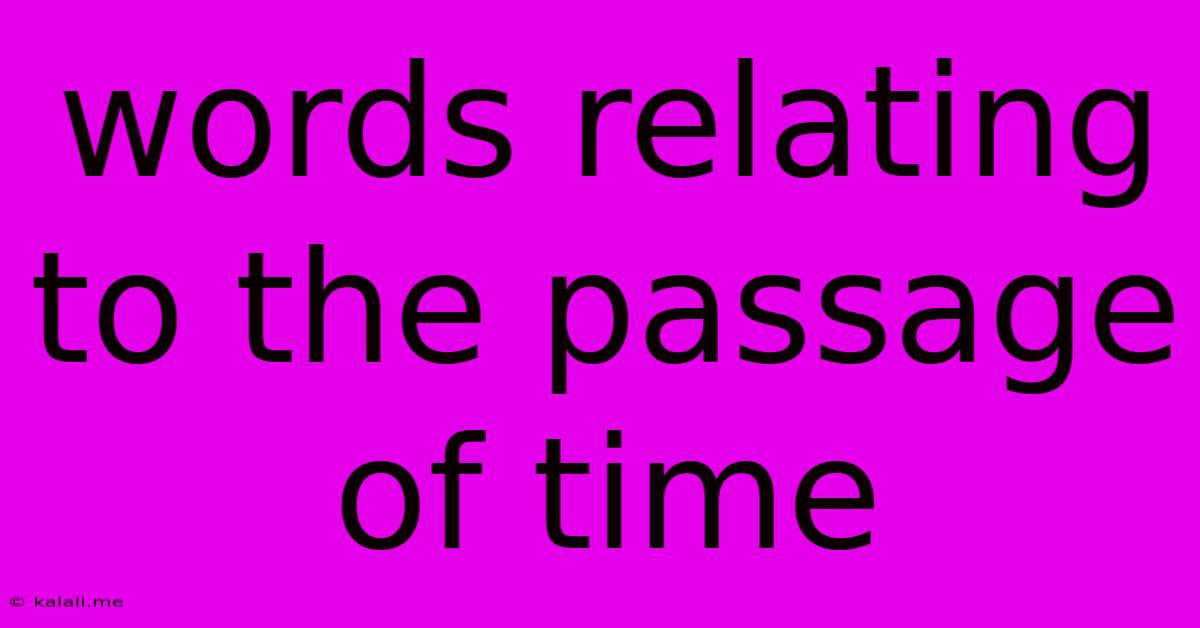Words Relating To The Passage Of Time
Kalali
Jun 01, 2025 · 3 min read

Table of Contents
Navigating Time's Flow: A Comprehensive Guide to Words Describing the Passage of Time
Time, that ever-flowing river, shapes our lives and experiences. Understanding the nuances of its passage is crucial for effective communication and storytelling. This article delves into a rich vocabulary dedicated to describing the passage of time, from the fleeting moments to the vast expanse of ages. We'll explore words that capture the speed, feel, and impact of time's relentless march.
Words for Swiftly Passing Time
When time flies by unnoticed, we need words that convey that rapid pace. Consider these options:
- Fleeting: Suggests a brief and ephemeral quality, often used for moments of beauty or happiness that quickly disappear.
- Evanescent: Similar to fleeting, emphasizing the vanishing or disappearing nature of time.
- Transient: Highlights the temporary and short-lived aspect of time.
- Ephemeral: Emphasizes the short-lived and often beautiful nature of something, perfectly capturing the fleeting passage of a moment.
- Swift: Simple and direct, indicating a rapid movement of time.
- Rapid: Similar to swift, but perhaps suggesting a more forceful or intense speed.
- Blur: Suggests a lack of clarity and a rapid succession of events, making it hard to distinguish individual moments.
Words for the Slow Passage of Time
Conversely, sometimes time drags on, feeling interminable. Here are words to capture that sensation:
- Sluggish: Implies a slow, heavy, and perhaps frustrating pace.
- Dragging: Suggests a tedious and unwelcome slowness.
- Languid: Conveys a slow, relaxed, and perhaps dreamy pace.
- Tedious: Highlights the boring and monotonous nature of time passing slowly.
- Interminable: Emphasizes the seemingly endless and unbearable length of time.
- Eternal: Suggests a timeless quality, often implying a sense of endless waiting.
- Protracted: Highlights the extended length of time, often implying unnecessary delay.
Words Describing the Stages and Marks of Time
Beyond speed, we use words to mark specific stages or periods in the passage of time:
- Epoch: A significant period of time, often marked by notable events or changes.
- Era: A long period of time, typically characterized by particular events or characteristics.
- Generation: A group of people born and living around the same time.
- Millennium: A period of 1000 years.
- Century: A period of 100 years.
- Decade: A period of 10 years.
- Annals: Historical records, often chronicling the passage of time.
- Chronology: The arrangement of events or dates in the order of their occurrence.
Figurative Language for the Passage of Time
Time is often described using metaphors and similes:
- Time marches on: A common idiom emphasizing the relentless and unstoppable nature of time.
- Time flies: A common expression to describe time passing quickly.
- Time heals all wounds: A proverb suggesting that time can resolve problems and emotional pain.
- Time is money: A proverb emphasizing the value of time.
- The sands of time: A metaphor for the relentless flow of time and the inevitable passing of life.
- A fleeting moment: A short, passing moment.
Mastering this vocabulary allows for richer, more evocative writing, enabling you to paint vivid pictures of time's passage in your narratives and descriptions. Whether you are writing a novel, crafting poetry, or simply engaging in everyday conversation, using precise language relating to the passage of time will significantly enhance your communication.
Latest Posts
Latest Posts
-
Can You Stretch Everyone To 4 Syllables
Jun 03, 2025
-
How To Do 1 Half In Calculator
Jun 03, 2025
-
Does Everyone Need The Dlc Civ 6
Jun 03, 2025
-
Illustroar Paste Text Asblock Not Line
Jun 03, 2025
-
How To Find A Big Name In The Field Academia
Jun 03, 2025
Related Post
Thank you for visiting our website which covers about Words Relating To The Passage Of Time . We hope the information provided has been useful to you. Feel free to contact us if you have any questions or need further assistance. See you next time and don't miss to bookmark.